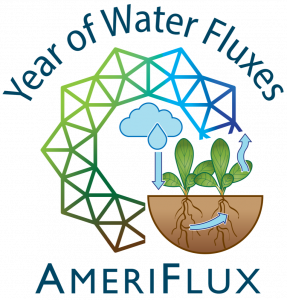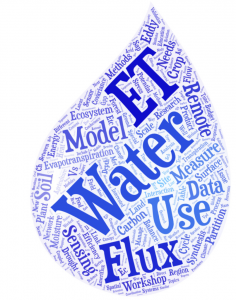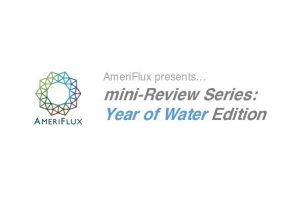
The AmeriFlux Theme Year of Water Fluxes was officially launched on March 21, 2021 and has inspired a flood of community activities. Read on to find out what’s going on and how you can get involved!
Rewatch: Let water cycle science wash over you
Two exciting events convened the community virtually already.
The Early Career Network Spring workshop was hosted by the FLUXNET Early Career Network and highlighted scientific research infused with water fluxes on the first day (you can rewatch these presentations here). On the second day, workshop organizers shared from their deep well of knowledge in applying Python tools to visualize and analyze data.
The Land-Atmosphere Interactions Workshop invited a number of speakers to share different perspectives on the coupled surface-boundary layer system (watch all talks here). Each session of presentations was followed by breakout discussions where participants distilled the most important research questions and challenges of the field.
Stay tuned for more workshops, which will be announced on our mailing list and the @AmeriFlux twitter account.
Channel your research papers into special issue journals
Two special issues can help your research make a splash!
A special collection entitled “Advances in scaling and modeling of land-atmosphere interactions” will be published across 5 AGU Journals. Submissions are open until Dec 31, 2021. Read all about it here.
A special issue on student-led research is brewing in Atmosphere. Deadline for manuscript submissions: 1 December 2021. Find out more here.
Float some ideas for teaching with water flux data
We are looking for volunteers to join a new working group. The goal is to develop open source teaching materials that utilize AmeriFlux data in education and draw from the deep reservoir of experience in the AmeriFlux community.
This could encompass homework assignments on water fluxes, semester projects, undergrad-grad student collaborations, outdoor activities with schools, and many other possibilities.
If you have an interest in developing such materials or prior experience in teaching with AmeriFlux data, at the high school, undergraduate or graduate student level, please email AMF-teaching@lbl.gov.
The working group will convene in September, and we hope you will join us!
An influx of funding for water-cycle measurements
AMP is being awarded funds to purchase water-cycle sensors for AmeriFlux sites! Starting in Fall 2021, AMP will be reaching out to eligible U.S. site PIs who filled out the March 2021 survey, to revisit possible purchases. In addition, we will have an opportunity for site PIs across the whole network regarding generation of water retention curves for their sites, in coordination with Kim Novick’s lab in Indiana.
A steady stream of water cycle and flux sessions at AGU
Whether you travel to New Orleans, or whether you connect virtually – one thing is clear: There is no shortage (a deluge?) of science sessions that can quench your thirst for water fluxes research at the AGU Fall Meeting 2021 (13-17 December 2021). Consider submitting an abstract to one of the many relevant sessions listed at the end of this post. The deadline for abstract submissions is August 4, 23:59 EDT.
You can lead a flux community to the water year but you can’t make them drink
The Year of Water Fluxes is buoyed by the active involvement of the AmeriFlux community. Contact the Water Fluxes Organizing committee to get involved or find collaborators for your idea!
How many water puns did you find in this post? And more importantly, are you ready to plunge in with us?
___________________________________________________
Water and Flux related AGU sessions – submit your abstract by August 4:
- A063 – Ground-Based Atmospheric Monitoring Networks
- B010 – Advances in understanding Water-Energy-Carbon interactions
- B011 – Advancing our understanding of vegetation stress and its feedbacks with energy, water, and carbon fluxes
- B018 – Carbon cycling in drylands: New findings and emerging frontiers
- B019 – Carbon Cycling in Global Peatlands
- B020 – Carbon Monitoring Systems Research and Applications
- B021 – Challenges and Opportunities of Managing Soil Carbon as a Natural Climate Solution
- B024 – Coastal wetland carbon and nitrogen cycles: Recent advances in measurements, modeling, and syntheses
- B030 – Ecosystem Disturbance: Leveraging research networks to improve understanding of dynamic ecosystems
- B034 – Gas Fluxes from and into Inland and Coastal Waters: Integrating Hydrodynamics and Biogeochemistry
- B042 – Improving Understanding of Land-Atmosphere Interactions through Integration of Surface Layer, Atmospheric Composition, and Atmospheric Boundary Layer Measurements
- B046 – Leveraging Emerging Technologies to Better Understand Environmental Microbial Carbon Processing and Nutrient Cycling
- B054 – New Advances in Land Carbon Cycle Modeling
- B057 – Opportunities and vulnerabilities related to ecosystem services of coastal ecosystems under climate change
- B060 – Regional Budgets, Trends, and Drivers of Major Greenhouse Gases (N2O, CH4, and CO2)
- B068 – Soils in the Anthropocene: New insights into soil carbon cycling from big data synthesis, research networks, and long-term studies
- B071 – Surface-Atmosphere Interactions: From Single Flux Measurements to Integrated Synthesis
- B080 – Understanding Natural and Anthropogenic Disturbances in Biogeochemistry and Carbon-water Coupling
- B086 – Wetlands and Peatlands in a Changing Climate: Science and Management
- GC090 – Urban Areas and Global Change
- H050 – Evapotranspiration (ET): Advances in In Situ ET Measurements and Remote Sensing-Based ET Estimation, Mapping, and Evaluation.
- H054 – Forest evapotranspiration and ecohydrology under a changing environment: Processes and quantifications
- H059 – Harnessing earth system data for understanding and predicting climate extremes in agriculture and urban systems
- H068 – Land-Atmosphere Interactions: From Bedrock to Boundary Layer
- H104 – The “Bark Side” of the Water Cycle
- H116 – Water surface evaporation – recent advances in observation and models
- H124 – Water-Soil-Vegetation Dynamics in Dryland Hydro-Ecosystems in Changing Climate






No Comments
Be the first to start a conversation